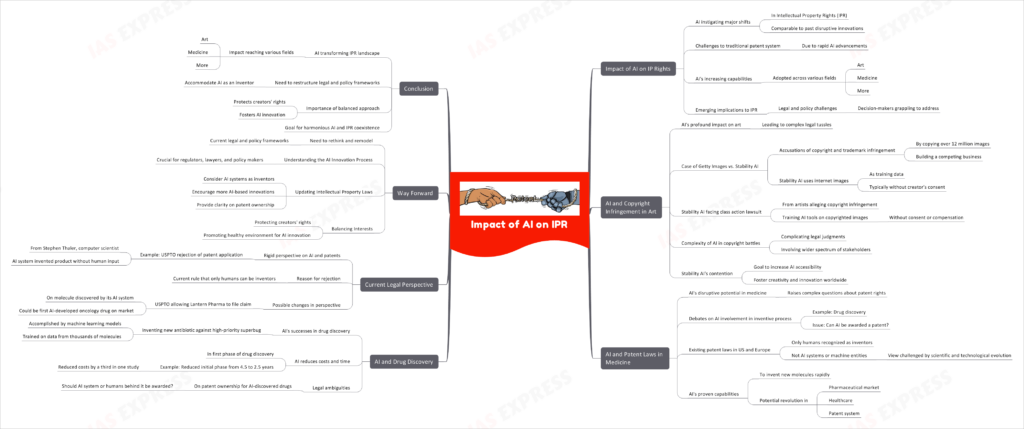Impact of AI on IP Rights- Implications for Art & Drug Discovery

AI has been instigating major shifts in the landscape of Intellectual Property Rights, akin to major disruptive innovations in the past. The traditional patent system, which has been evolving over centuries, is now being challenged by the rapid advancements of AI. With AI’s increasing capabilities and adoption across fields such as art, medicine and more, the implications and challenges to the existing IPR are emerging, with legal and policy decision-makers grappling to understand and address them.

The AI Revolution and Its Effect on IPR
AI and Copyright Infringement in Art
AI has had profound impact on art, leading to legal tussles that are far from straightforward. For instance, Getty Images accused Stability AI of copyright and trademark infringement for copying over 12 million images to build a competing business. Stability AI, like many AI-based firms, uses images from the internet as training data, typically without explicit consent of the creators.
- Stability AI is also facing a class action lawsuit from artists who allege that the company trained its AI tools on copyrighted images without consent or compensation.
- AI adds a new level of complexity to copyright battles, complicating legal judgments and involving a broader spectrum of stakeholders.
- The contention of Stability AI is that their goal is to increase AI accessibility to foster creativity and innovation worldwide.
AI and Patent Laws in Medicine
The sphere of medicine is also witnessing the disruptive potential of AI, raising complex questions about patent rights. For instance, can an AI system involved in an inventive process such as drug discovery be awarded a patent?
- The existing patent laws in the US and Europe only recognize humans as inventors, not AI systems or machine-based entities, a view challenged by the evolution of science and technology.
- AI has proven its capability to invent new molecules rapidly, which could revolutionize the pharmaceutical market, healthcare and the patent system.
AI and Drug Discovery
AI has achieved remarkable successes in drug discovery, like inventing a new antibiotic effective against a superbug listed as a high-priority pathogen by WHO. This was accomplished through machine learning models trained on data from thousands of molecules, highlighting AI’s potential in this field.
- AI significantly reduces costs and time in the first phase of drug discovery. For instance, it cut down the initial phase from 4.5 years to 2.5 years and reduced costs by a third in one study.
- There are legal ambiguities as to whether the patent for drugs discovered by AI should be awarded to the AI system or to the humans behind it.
The Current Legal Perspective
The current legal perspective on AI and patents is still quite rigid. This is evidenced by the US Patent and Trademark Office (USPTO) rejecting a patent application from Stephen Thaler, a computer scientist whose AI system invented a product without any human input.
- The reason for rejection was the current rule that only humans can be inventors.
- However, the winds of change might be setting in with the USPTO allowing Lantern Pharma to file a claim on a molecule discovered by its AI system. This could potentially be the first AI-developed oncology drug on the market.
Way Forward
Given the profound and far-reaching implications of AI on the IPR system, it is crucial to rethink and remodel the existing legal and policy frameworks.
- Understanding the AI Innovation Process: A comprehensive understanding of the AI innovation process and its nuances is crucial for regulators, lawyers, and policy makers.
- Updating Intellectual Property Laws: Intellectual property laws need to be updated to consider AI systems as inventors. This will encourage more AI-based innovations and provide clarity on patent ownership.
- Balancing Interests: It is essential to strike a balance between protecting the rights of creators and promoting a healthy environment for AI innovation.
Conclusion
AI is indisputably transforming the landscape of IPR in unprecedented ways, with its impact reaching across various fields from art to medicine. With AI-based inventions becoming more common, it is imperative to rethink and restructure the existing legal and policy frameworks to accommodate AI as an inventor. In this dynamic environment, a balanced approach that protects creators’ rights while fostering AI innovation will pave the way for a future where AI and IPR coexist harmoniously.
Practice Question for Mains:
Comment on the impact of AI on IPR. What is the way ahead? (250 words)
If you like this post, please share your feedback in the comments section below so that we will upload more posts like this.

